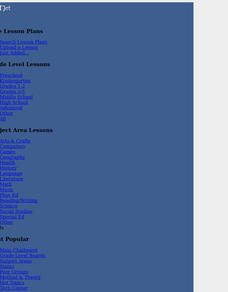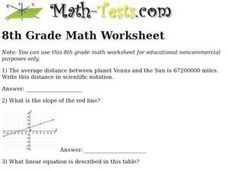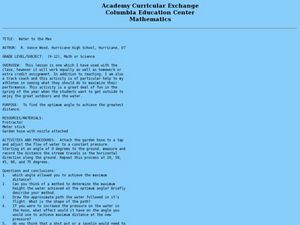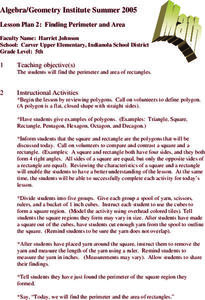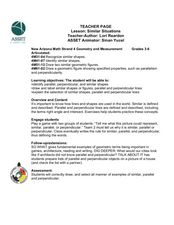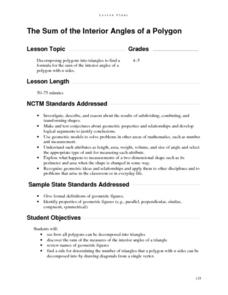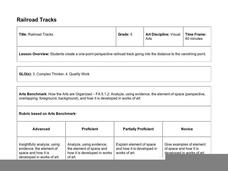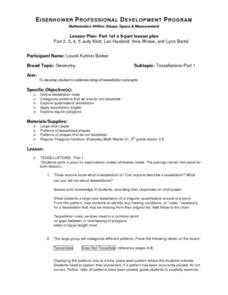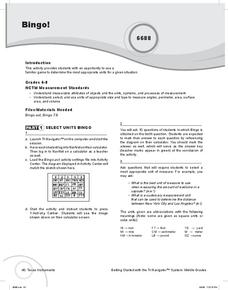Curated OER
Lesson Exchange: Polygons (Middle, Mathematics)
Students discover the relationship between the sides of a polygon and the number of diagonals that can be drawn from one vertex, the number of triangles that those diagonals form, and the sum of the interior angles of that polygon.
Curated OER
Classifying and Constructing Corners
Fifth graders, after seeing Honeycomb examples, complete a Classifying Angles worksheet, Clock worksheet, and Defining Angles worksheet.
Curated OER
8th Grade Math Worksheet
In this linear equations worksheet, 8th graders solve 10 different problems that include various types of linear equations. First, they write the distance between Venus and the Sun in scientific notation. Then, students determine the...
Curated OER
Water to the Max
Students experiment with the angle that yields the greatest distance of water at constant pressure. In this experiment with the angle that yields the greatest distance of water at constant pressure lesson, students shoot water out...
Curated OER
Finding Perimeter and Area
Geometers find the perimeter and area of rectangles. They discuss the definitions and characteristics of rectangles and squares. In groups, they use yarn to discover the perimeter of squares and rectangles. They count cubes to explore...
Curated OER
Similar Situations
Young scholars explore intersecting lines. In this intersecting lines lesson, students investigate shapes consisting of parallel, perpendicular, and similar lines. Young scholars investigate these lines in shapes around them.
Curated OER
Triangle Attributes and Measures
Seventh graders explore the concept of triangles. In this triangles instructional activity, 7th graders sort triangles according to various attributes such as acute, obtuse, isosceles, or equilateral. Students find the area and perimeter...
Curated OER
Measurement
Fifth graders measure specified distances when given perpendicular lines. In this measurement lesson plan, 5th graders draw the lines themselves.
Inside Mathematics
Rhombuses
Just what does it take to show two rhombuses are similar? The assessment task asks pupils to develop an argument to show that given quadrilaterals are rhombuses. Class members also use their knowledge of similar triangles to show two...
Curated OER
Practice: Word Problems
Congratulations, you've just hit the word problem jackpot! Covering an incredible range of topics from integers and fractions, to percents, geometry, and much more, this collection of worksheets will keep young mathematicians...
Improving Measurement and Geometry in Elementary Schools
The Sum of the Interior Angles of a Polygon
Junior geometers discover that polygons can be decomposed into triangles and that the number of triangles can be determined by a rule. Note that the Geometer’s Sketchpad® software is required to carry out all components of this...
Curated OER
Circles 1, 2, 3, 4
Here is a way to help your charges identify circles and spheres. In this shapes geometry and technology lesson, students identify and draw circles and explain the related attributes. They recognize circles and spheres while exploring...
Curated OER
Parallel and Perpendicular Lines
Learners study parallel and perpendicular lines. In this parallel and perpendicular lesson, pupils explore 2-D shapes and determine if the sides are parallel or perpendicular.
Curated OER
Orienting a Photovoltaic Cell
By mounting a light bulb on a stand and a PV cell on another, physics apprentices experiment with the angle of incidence. Their goal is to determine the optimum angle for collecting solar energy. The use of a scientific calculator...
Arizona State University
Tricorn Triangles
Help your learners examine triangles. Pupils explore the different sizes and measurements of triangles. They discover triangles can be isosceles or scalene, and examine the attributes of triangles. Here is the website where you can...
Hawaiʻi State Department of Education
Railroad Tracks
Ahhh the vanishing point! Sounds ominous, but it's not. Fifth graders analyze the use of perspective in Renaissance art. They practice using linear perspective to draw railroad tracks that seem to go on forever. Tip: Make this...
Curated OER
ndirect Measurement Technique: Using Trigonometric Ratios
Ninth graders find the height of an object that would be difficult or impossible to measure directly. They construct and use a Clinometer to measure the angle of elevation (or depression). Students create a sketch of the measurement...
Curated OER
Artistic Angles
Fifth graders explore angles by using protractors. They recognize, describe and determine the surface area and volume of three-dimensional shapes. Students recognize the right angle, acute angle, obtuse angle and vertex. They identify...
Curated OER
Making Rectangles
Students study rectangles. In this math lesson, students use numbers, measurements and geometry to draw rectangles of varying sizes.
Curated OER
Geometry /Tessellations
Students investigate the concept of tessellations and how they are formed using angles. They categorize how different patterns do and not tessellate and separate them into two different places for assessment. The teacher draws examples...
Canton Museum of Art
Personal Clay Box
High schoolers will love this geometrically exact ceramics project; they create a personalized clay box using the slab method and mathematical measurements. They utilize scoring and square construction and can decorate the boxes to...
Curated OER
Mathematics Within: Shape, Space & Measurement
Students experiment and analyze triangulation to assess degrees of combined angles, predict polygons that tessellate as well as extending of shapes to create tessellations. They explore the concept of why some polygons tessellate when...
Curated OER
My Test Book: Geometry
In this online interactive math skills worksheet, students solve 10 multiple choice math problems regarding geometry skills. Students may view the correct answers.
Curated OER
Bingo
Students practice determining the most appropriate units for a given situation while measuring attributes of objects, systems and processes of measurement. They review the concepts of angles, perimeter, area, surface area and volume.


